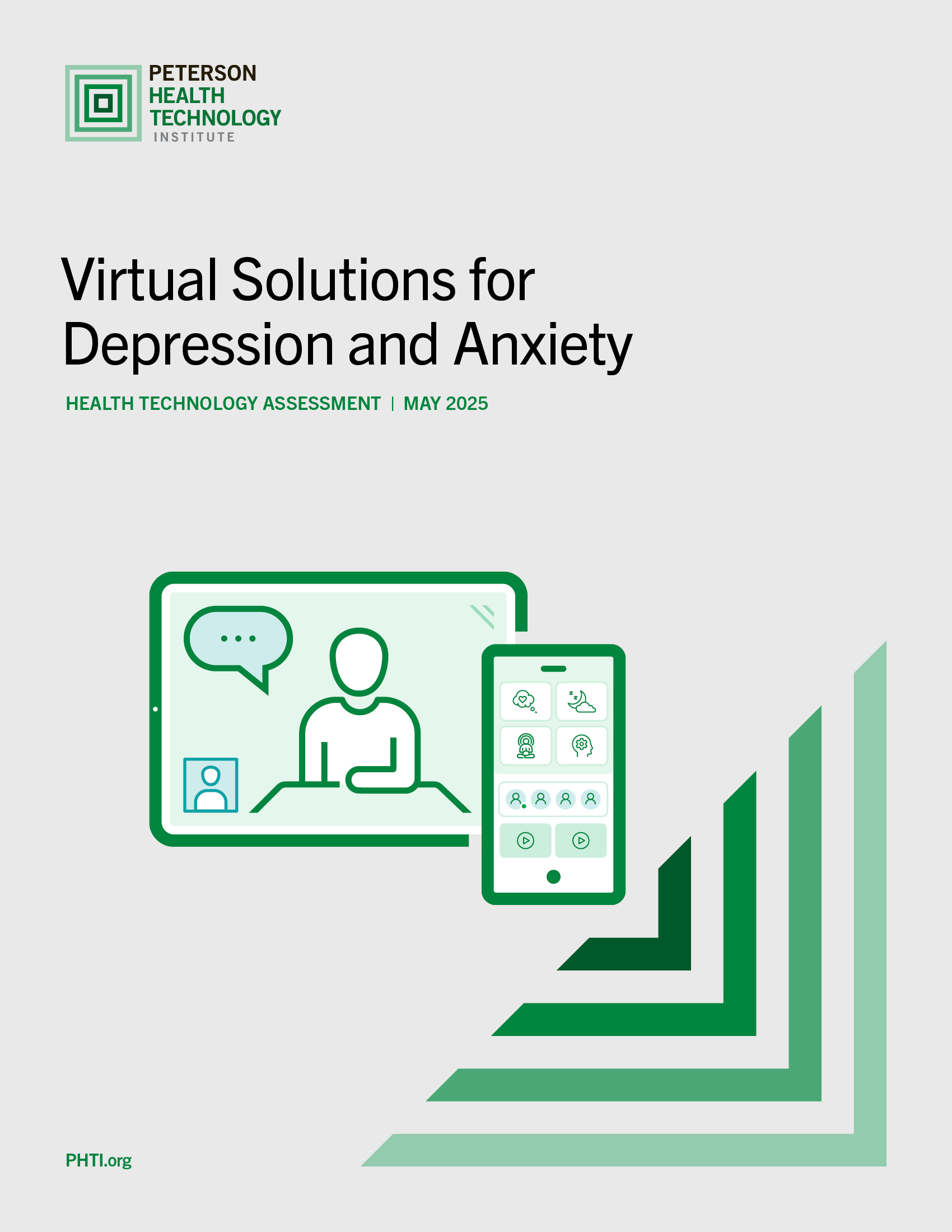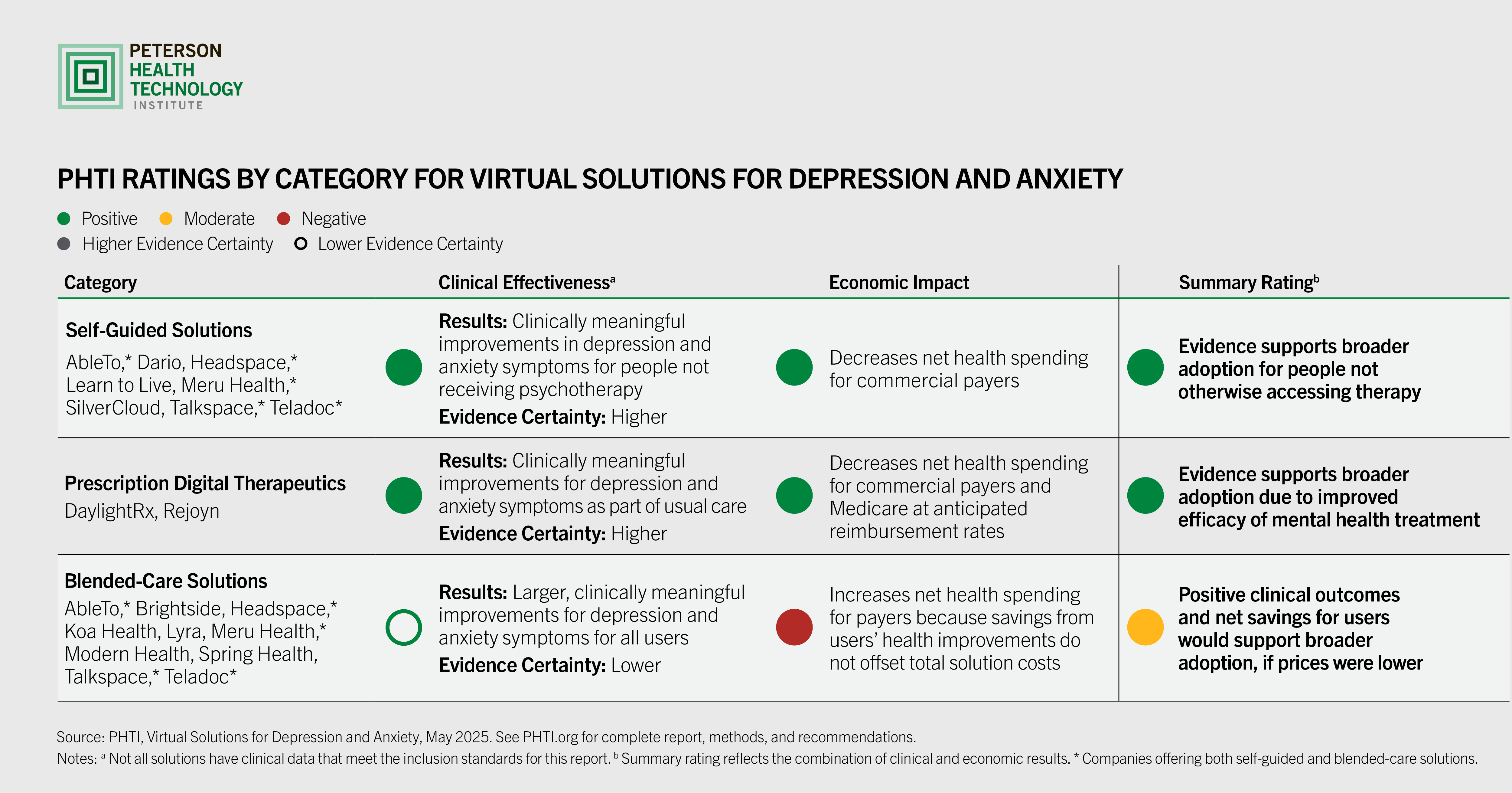completed Assessment
Virtual Solutions for Depression and Anxiety
Assessment Released
Last Updated
September 3, 2025
Conditions
Depression, Anxiety
"*" indicates required fields
PHTI assessed virtual solutions for depression and anxiety that include on-demand, digital content and activities used on their own or in combination with therapy and medication.
Area overview
Depression and anxiety are two of the most common mental health conditions in the United States, affecting more than one in five adults. For individual patients, these conditions can result in impaired focus, reduced motivation, disruptions to daily functioning, and suicidal ideation. Despite efforts to expand screening, many people with symptoms of anxiety or depression do not receive effective treatment
Virtual solutions for depression and anxiety aim to improve patients’ symptoms and expand access to timely care. These solutions can be grouped into three broad categories:
- Self-Guided Solutions—Offer a range of digital content, including lessons and activities, that users can access anytime and select topics that meet their needs. Some also offer coaching support.
- Prescription Digital Therapeutics (PDTs)—Are FDA-cleared, software-based digital therapies that deliver digitized behavioral interventions which can be used in conjunction with clinician-supervised outpatient treatment. These must be prescribed to patients.
- Blended-Care Solutions—Build on the self-guided digital content by integrating virtual care teams with licensed therapists and psychiatrists who can deliver mental health treatment.
Download the evaluation

Virtual Solutions for Depression and Anxiety
Updated September 3, 2025
May 20, 2025
Executive SummaryMay 20, 2025
Patient GuideMay 20, 2025
Overview for PolicymakersSeptember 3, 2025
AppendicesSeptember 3, 2025
Data SupplementJanuary 21, 2026
Performance-Based Contracting ToolkitReport contributors and reviewers provided important expertise and insight throughout our process. Those who directly contributed to the report have no relevant conflicts of interest to disclose.
Summary of findings
Based on PHTI’s review of the clinical evidence, virtual solutions for depression and anxiety can meaningfully improve outcomes for people with mild to moderate symptoms. In addition, the report finds that while virtual mental health solutions reduce spending for individual users, some have pricing models that increase total costs for employers and plans.

Webinar
Guidance & considerations for stakeholders
- Improve evidence generation by developing more comparative studies examining long-term durability of clinical effects, effectiveness across diverse populations, and outcomes for patients with mild symptoms.
- Enhance engagement by researching and implementing features that increase sustained user participation, which correlates strongly with better clinical outcomes.
- Focus on efficient care delivery through appropriate triage and stepped-care models that match patients to the most clinically appropriate and cost-effective support.
- Align payment models with clinical benefits by creating variable pricing structures and value-based contracts that reduce per-member fees and shift toward outcome-based reimbursement.
Why assess virtual solutions for depression and anxiety?
- In the United States, one in five adults experience depressive symptoms in a given two-week period, and roughly one in six experience symptoms of anxiety.
- Many individuals who are diagnosed with depression and anxiety do not receive effective treatment because of access barriers, such as provider shortages, costs and insurance challenges, social stigma, and poor follow-up.
- Nationally, these disorders carry a significant economic burden—accounting for $240 billion in treatment costs, as well as lost productivity.
- Virtual solutions aim to expand access to treatment by delivering asynchronous, digital content that can be used instead of or in addition to therapy or other treatment. Some solutions also integrate a network of therapy providers.
- These solutions combine initial assessments using validated screening tools, libraries of digital content that users can access anytime, coaching support to drive engagement, and, in some cases, therapy from licensed providers.
- More than half (56%) of purchasers surveyed in PHTI’s 2024 State of Digital Health Purchasing survey said they currently offer mental health solutions and that mental health remains a priority in the year ahead.
- Given the burden of disease and impact on the healthcare system, payers, providers, and patients are eager to understand which virtual depression and anxiety solutions deliver meaningful clinical results at a lower cost.
Additional resources
October 2024
Methodology for a Systematic Literature Review of digital health technologies for anxiety and depressionInternational prospective register of system reviews (PROSPERO), National Institute for Health and Care Research
Contact
Get in touch with us if you want to learn more about opportunities to provide input on this assessment.
"*" indicates required fields
Read an overview of our assessment Approach and Framework
View assessment frameworkRelated news
-
Read ArticleNov 4, 2025News Coverage
Forbes
Why Employers May Want To Rethink Digital Mental Health Investments
-
Read ArticleMay 20, 2025News Coverage
CNBC Healthy Returns
Virtual solutions for depression and anxiety are effective, but can increase costs, report says
-
Read ArticleMay 20, 2025News Coverage
STAT
Mental health apps can boost outcomes and lower costs, study finds
-
Read ArticleMay 20, 2025News Coverage
Modern Healthcare
Digital behavioral health can lower costs, improve care: report
-
Read ArticleMay 20, 2025News Coverage
Fierce Healthcare
Virtual depression and anxiety programs prove effective but costs vary wildly, PHTI finds
-
May 20, 2025Announcement
Virtual Solutions for Mental Health Improve Symptoms and Expand Access, but Some Tools Come with High Costs
An independent evaluation from the Peterson Health Technology Institute finds virtual solutions are effective for treating depression and anxiety
Stay up to date
Sign up to receive updates.